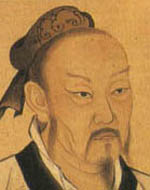Gallery of Philologists
The Northern Mencians
c0300-c0250
The historical Mencius lived from about 0386 to 0303. As far as we can now determine, Mencius did not much concern himself with authenticity questions. Shortly after his death, his followers, probably then located in Tvng, where Mencians had held his last official position, split into two groups, one of which left to form their own school, most likely in Dzou (Mencius's birthplace), somewhat to the north. It is this northern school, whose text comprises MC 4-7 (c0290 - c0250), which developed a strong interest in the ancient sanctions for their doctrines. This involved them in criticizing the traditions invented by rival viewpoints to support their doctrines.
MC 5, the one northern chapter which is without a close analogue in the preserved writings of the southern school, is much concerned to dispute conflicting traditions about ancient rulers, particularly the fictitious emperor Shun, who first appears in the Warring States literature toward the end of the 04th century, and whose historical persona was still being formed in the early 03c. The formation process was essentially a war of words, of assertions and counter-assertions, about an undocumented and partly imagined antiquity.


A more severe problem was presented by the written texts which claimed to actually date from antiquity, and to contain the actual words or deeds of notable historical personages. One important group of such texts is called the Shu "Documents" or Shang-shu "Ancient Documents." Among those which most aroused the ire of the Mencians was one called Wu-chvng, or "The End of the Affray," which claimed to give an account of the conquest of the last evil Shang ruler by the virtuous first Jou ruler. They had their school founder Mencius speak of the text in this wise:


"If we are to believe all the Shu, it would be better not to have the Shu at all. As for the Wu-chvng, I accept only two or three sections of it." (MC 7B3, c0255)
The basis for this rejection of most of the Wu-chvng was moral rather than philological. The document portrayed a fierce battle when Jou overcame the previous dynasty Shang, implying that those on the Shang side fought vigorously and with dedication, whereas Mencian political theory held that the last ruler of Shang was a bad man who deserved to forfeit the Mandate of Heaven, and whose people should thus have been thoroughly disaffected, and welcomed their conquerors with a minimum of armed resistance. The MC 7B3 judgement relies on the human probabilities, as other passages in Mencius recommend, but here they are clearly the human probabilities as seen through the framework of Mencian theory.
Whatever its basis, that an explicit doubt about the authenticity of a text was expressed at all was a notable event in the period: it was not good form to assail the credentials of somebody else's text.
As for the Shu at large, doubts about their credibility continued to arise, over the years, some of them based on their character as texts rather than their conformity to theory. Yen Rwo-jyw, in the 17th century, made a thorough study of a certain subgroup of Shu (all of which had by then had been canonical for millennia), and showed, on both internal and external evidence, that they were forgeries of the Imperial period.
Readings
- James Legge. The Works of Mencius (Chinese Classics v2). See p479.
- James Legge. The Shoo King or The Book of Historical Documents (Chinese Classics v3). The eventual canonical text of the Wu-chvng is at pages 306-317. That text is from the group of Shu which Yen Rwo-jyw later proved to be Imperial period forgeries, and thus has nothing to do with the one presumably seen by the northern Mencians in c0250. The line quoted by the Mencians is here, but in a different context which changes its meaning utterly; see p314.
1 Dec 2005 / Contact The Project / Exit to Gallery Index Page
